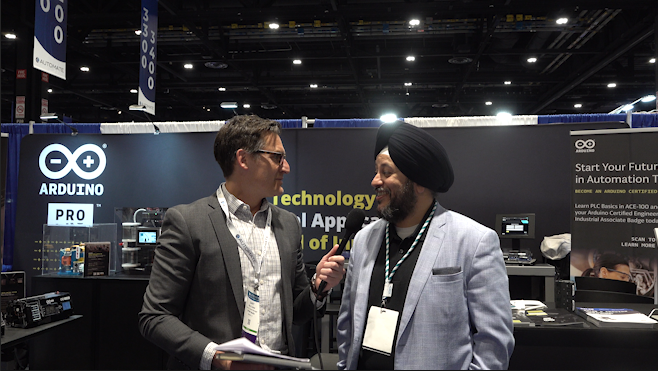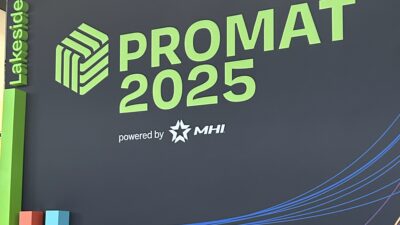Guneet Bedi of Arduino promoted how open-source technology and platforms can help drive technology and innovation at the Automate Show 2024 in Chicago. The company also promoted its industrial line and the benefits of interoperability.

Since its inception in 2005, Arduino has believed strongly in open-source technology and platforms. Representatives of the company promoted how these principles can help drive technology and innovation at the Automate Show 2024 at McCormick Place in Chicago. Open source was the key to Arduino’s popularity with makers early on, but it has also proven to be a business-savvy approach, providing tangible benefits to industries from manufacturing to logistics.
“Because of the change in the landscape and the talent shortages, a lot of people are coming here to get simple automation solutions,” said Guneet Bedi, senior vice president and general manager of the Americas for Arduino. “Everybody grew up with Arduino, so we have 36 million followers, and all of them come here and see that they can use us in automation and work.”
The benefits of interoperability
Bedi spoke at length about some of the recent advancements at Arduino, which has grown to provide a reliable and high-performance ecosystem of hardware, software and cloud solutions for professionals. A few years ago, the company launched a line called Arduino Pro (arduino.cc/pro), featuring industrially ruggedized components and electronics, microcontrollers, applications, gateways and more.
“Now, all the 36, 37 million people who got used to Arduino in their garages can use them at work,” Bedi said.
The Opta micro-PLC, described as the Swiss Army Knife of industrial automation, is a perfect example of this. Opta has been successfully adopted to integrate automation with Internet of Things (IoT) applications due to its security features and built-in connectivity options. It allows users to avoid vendor lock-in and is suitable even for beginners in industrial and building automation, remote monitoring and control and IoT. Arduino Opta can be programmed with the key IEC 61131-3 languages as well as within the Arduino environment, also relying on many ready-to-use software libraries and sketches. The fact that it’s open-source, user-friendly, cost-effective and has no vendor lock-in translates into lowering barriers and making technology more accessible to everyone.
“It’s the ease of use and programmability, as well as the cost effectiveness in the low-end automation use cases without the concern of going against your vendors,” Bedi said. “I think interoperability is going to be king. We are big supporters, of course, of OPC, OPC UA — all the protocols — and, of course, ethernet, Modbus, TCP. The whole idea is the more interoperable you are, the better. That goes to the foundation of Arduino. We started in design school teaching design students how to do electronics, and we will always, always be the Switzerland — although we’re Italian — of the electronics world.”
Dedication to STEM learning
At the Automate Show, Arduino also doubled down on their dedication to science, technology, engineering and mathematics (STEM) education. From customer support to training initiatives, the company works to empower people with the right tools and knowledge by democratizing electronics. As such, they offer free courses, tutorials and online how-to’s to help engineers in the control and automation space, as well as in universities, understand the basics of how to use their products.
“We have kits that are for education as well as for community colleges and technical-vocational schools,” Bedi said. “But we will always, always keep our software free, and we will always keep our tutorials and courses free.”
In a world where innovation is the lifeblood of success, adopting open-source technology platforms can be a savvy move for entrepreneurs and engineers worldwide.



